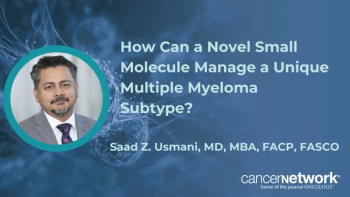
Zanubrutinib Combo Could “Prolong Time in Remission” for Follicular Lymphoma

The FDA approval of zanubrutinib plus obinutuzumab showed a benefit to patients with relapsed/refractory follicular lymphoma, according to Julie Vose, MD, MBA.
CancerNetwork® spoke with Julie M. Vose, MD, MBA, prior to the
Vose is the division chief, Neumann M. and Mildred E. Harris Professor in the division of hematology and oncology at the University of Nebraska Medical Center.
The approval is based on results from the phase 2 ROSEWOOD trial (NCT03332017), which assessed the efficacy and safety of zanubrutinib plus obinutuzumab compared with obinutuzumab alone in patients with relapsed/refractory follicular lymphoma.2
The primary end point was overall response rate (ORR). Secondary end points included duration of response (DOR), progression-free survival (PFS), overall survival (OS), complete response (CR) rate, and safety and tolerability.
At a median follow-up of 20.2 months, the ORR per independent central review (ICR) was 69% in the experimental arm compared with 46% in the obinutuzumab arm, with a risk difference of 23% (95% CI, 9%-37%; P = .001). The CR rate by ICR was 39% in the combination arm compared with 19% in the obinutuzumab arm. The median time to first response was 2.8 months in the combination arm (range, 2.0-23.0) and 2.8 months in obinutuzumab arm (2.5-6.5).
The median PFS by ICR was 28.0 months (95% CI, 16.1-not estimable) vs 10.4 months (95% CI, 6.5-13.8) in the combination arm and obinutuzumab arm, respectively (HR, 0.50; 95% CI, 0.33-0.75; P <.001).
Median DOR by ICR was not reached in the combination arm and was 14.0 months in the obinutuzumab arm. The estimated 18-month DOR rate in the combination arm was 69%. The estimated OS rates at 24 months were 77% and 71% in the combination and obinutuzumab arms, respectively.
Transcript:
Patients with follicular lymphoma patients live for many years, and, over that time, they'll need many different treatments. Chemotherapy [plus] immunotherapy is one of them, but it’s always good to have pathway-directed agents, which zanubrutinib is. That is something that is [observed in the randomized ROSEWOOD trial], which showed a benefit over obinutuzumab alone. It’ll bring a new class of agents that we can use for follicular lymphoma, and also we’ll be able to combine with other agents to prolong the time that patients stay in remission.
Reference
- FDA grants accelerated approval to zanubrutinib for relapsed or refractory follicular lymphoma. News release. FDA. March 7, 2024. Accessed March 7, 2024. https://shorturl.at/eILUV
- Zinzani PL, Mayer J, Flowers CR, et al. ROSEWOOD: A phase II randomized study of zanubrutinib plus obinutuzumab versus obinutuzumab monotherapy in patients with relapsed or refractory follicular lymphoma. J Clin Oncol. 2023;41(33):5107-5117. doi:10.1200/jco.23.00775
Newsletter
Stay up to date on recent advances in the multidisciplinary approach to cancer.





































